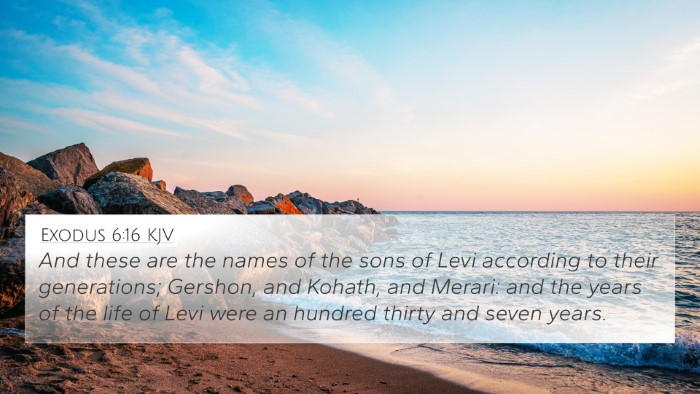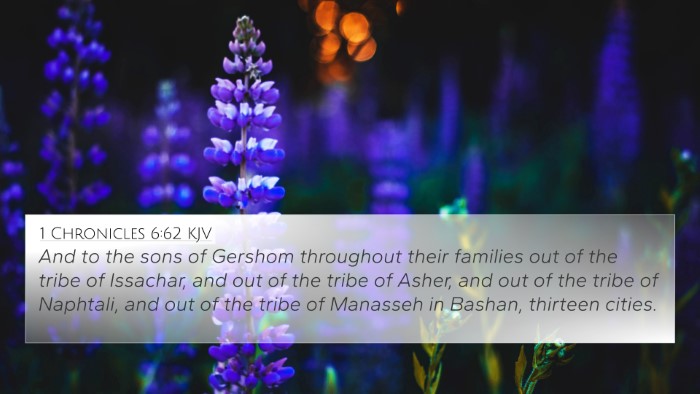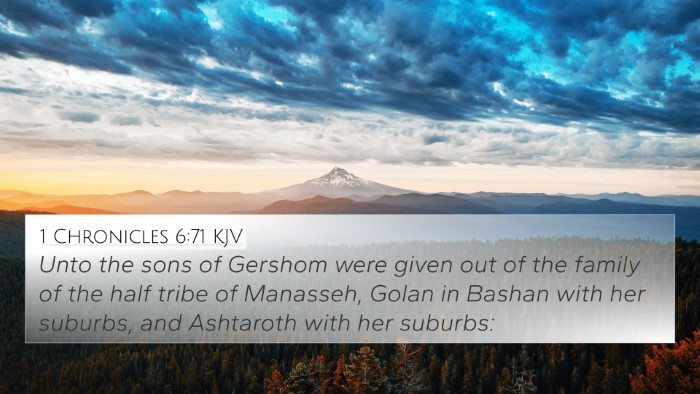Understanding Joshua 21:6
Joshua 21:6 states, "And the children of Gershon had by lot out of the families of the tribe of Manasseh ten cities." This verse highlights the allocation of cities to the Levite family of Gershon from the tribe of Manasseh. It signifies the importance of God's provision for His people and the specific roles assigned to the Levitical priesthood.
Commentary Insights
Matthew Henry's Commentary emphasizes that the allocation of cities to the Levites serves not only as a means of sustenance but also as a reminder of the spiritual leadership they were to provide within the community. Gershon, one of the sons of Levi, is underscored here as part of God’s overarching plan to ensure that His priests were well distributed across the tribes to maintain worship and guidance.
Albert Barnes' Notes on the Bible elaborates on the symbolism of cities given to the Levites. It represents God's grace and how He fulfills His promises to His people. The appointment of cities is not arbitrary but rather part of God's meticulous planning, ensuring that His servants have a locality to serve and minister effectively.
Adam Clarke's Commentary focuses on the statistical aspect and how it reflects God's order in the establishment of His kingdom on earth. By assigning ten cities specifically to the children of Gershon, it heightens one's understanding of the division of labor and responsibilities amongst the tribes, showcasing the divine structure within the community.
Cross-References to Joshua 21:6
- 1 Chronicles 6:54-56: Discusses the cities designated to the Levite families.
- Deuteronomy 10:9: Explains the Levites' unique role and inheritance.
- Joshua 14:4: References the Levitical inheritance among the tribes.
- Numbers 35:2-7: Details the establishment of cities of refuge for the Levites and their purpose.
- Hebrews 7:14: Clarifies the Levitical priesthood in the light of the New Covenant.
- Exodus 32:29: Mentions the Levites' duties in the service of the Lord.
- Leviticus 25:32-34: Outlines the inheritance regulations for the Levites.
- Joshua 13:14: States the specific roles of the Levites as a set apart for the Lord.
- Psalm 78:70-72: Highlights God's choosing of David as a shepherd, paralleling the role of the Levites.
- Malachi 2:4-7: Comments on the priestly duties and their importance in communication between God and the people.
Thematic Connections
The allocation of cities to the Levites signifies a strong connection between the Old Testament laws and the New Testament understanding of service and sacrifice. This theme can be richly explored with comparative Bible verse analysis across various scripture segments, linking the role of the Levites to New Testament teachings regarding priesthood and community service.
Importance of Cross-Referencing Biblical Texts
Cross-referencing is an invaluable tool for deeper understanding. By linking Bible scriptures like Joshua 21:6 to the verses mentioned above, one can unveil the harmonic relationships within the Bible that highlight God's persistent promises and the integrity of His covenant with the Israelites and believers today.
Tools for Bible Cross-Referencing
- Bible Concordances: They provide exhaustive references of words and phrases, helping find related verses.
- Cross-Reference Guides: These guides help direct readers to scriptures that share thematic or narrative parallels.
- Digital Bible Study Tools: Software and apps can allow unprecedented connectivity among verses for quick analysis.
- Bible Reference Resources: Books and commentaries that expand on connections between different scriptures offer depth and context.
Conclusion
Joshua 21:6 serves not only as a historical note regarding land allocation but also allows for exploration into deeper spiritual truths about God's ongoing relationship with His people. By employing cross-referencing and thematic connections, readers can significantly enhance their understanding of biblical narratives and the inter-Biblical dialogue that enriches their faith.
Understanding how to find cross-references in the Bible and using them effectively in study or sermon preparation results in a more coherent grasp of scriptural truths and themes, making the Word of God more accessible and relatable.







